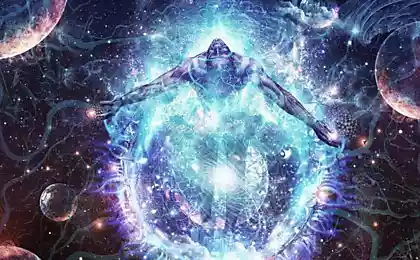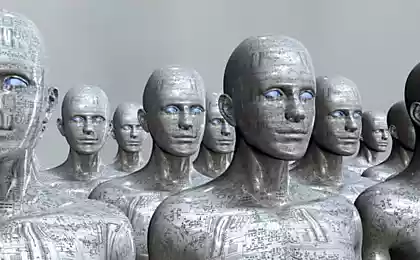807
New magic: David Brooks about the coming revolution of consciousness
Twenty million six hundred sixty four thousand thirty four
© Alex Podesta
As the cult of rationality and material success have influenced our understanding of human nature? What we have learned about myself thanks to modern scientific research? Political journalist and columnist for The New York Times, author of several books on contemporary American culture David Brooks spoke at a TED lecture about a new humanism.
When I got my current job, I was given some good advice is to interview three politicians every day. And after such close contact with them, I can tell you one thing — they are emotional freaks. All of them have what I call dementia with verbal diarrhea: they claim that they themselves are crazy. But what they can not refuse, so it in ability to communicate. When you meet, they look you in the eye, they invade your personal space, massaging the back of your head.
The paradox is that when these people begin to engage in politics, disappears their social awareness, they start talking like accountants. During my career I covered in the press numerous political failures. We sent in economists with privatization plans in the collapsed Soviet Union, but the society they did not believe. We launched a military invasion of Iraq, but forgot about the existing cultural and psychological climate. Our system of financial regulation was based on the assumption that stock traders are rational creatures that don't do anything stupid. For 30 years I've been covering school reform. We were able to achieve the reorganization of the relative benefits of private schools, sureties. But year after year the results were disappointing. In fact, people learn from people they love. And if you don't take into account the individual relationship between teacher and student, you do not take into account reality. This reality was expunged from our political process.
"For centuries we have inherited a view of human nature based on the idea of a separated "I" — separate from the emotions, the mind and society, progressive as the suppression of the passions of the mind." And I asked myself: "Why are the most socially attuned people on earth inhuman in politics?"And came to the conclusion that it's just a sign of more serious problems. For centuries we have inherited a view of human nature based on the idea of a separated "I" — separate from the emotions, the mind and society, progressive as the suppression of the passions by reason. As a result, we perceive ourselves as rational individuals reacting directly to stimuli. We are trying to use the physics to determine cheloveskom behavior. Were amputation, we have to consider human nature very superficially.
You can see this at the example of how we raise our children. Come to the elementary school three hours a day and see kids out there with their 35-pound backpacks. Children pick up creatures I've called uber-moms — women who successfully made their career and who took a day off to make sure that their children will go to Harvard. Children are brought up a certain way, jumping through hoops of measured achievement — graduation tests, playing the oboe, soccer. Enter the best universities, get good jobs, earn a lot of money and sometimes become successful in a superficial manner. They have children and marry a beautiful partner, embodying their families the miracle of genetics: their grandmoms look like Gertrude Stein, their daughters looks like Halle berry — God knows how they do it. Their philosophy of life to old age is no time to form, but they decide that they will not die if all the life in all succeed. And so they hire personal trainers and popping Cialis like breath mints.
"This new look is not based on theology or philosophy, and the study of the mind by various scientists, from neurologists to cognitivists, behavioral economists, psychologists, sociologists".Although it is a part of life, it isn't everything. Over the past years, we have a much deeper examination of human nature — who we are. This new view is not based on theology or philosophy, and the study of the mind by various scientists, from neurologists to cognitivists, behavioral economists, psychologists, sociologists. When you put it all together, get a new perspective on human nature, far from the cold materialism — a new humanism, a new enchantment. And if I were to summarize all of these studies, it is possible to formulate three main points to three underlying characteristics of a person.First, while the mind writes the autobiography of our species, our unconscious is doing most of the work. The human mind can perceive millions of bits of information a minute, of which about forty recognized. This can cause oddities: for example, people named Dennis likely to become dentists (eng. dentist) above average, and people named Lawrence are more likely to be lawyers (eng. lawyer) — we are unconsciously drawn to things like sound. In addition, our unconscious is not stupid and sexualized, and, in fact, quite smart. One of the most cognitively demanding things we do is buy furniture. It is difficult for us to imagine how a sofa will look at home. You need to first examine the options available, give this information marinate in my head, to escape, and after a couple of days to trust my instincts — the subconscious mind already decided.
Secondly, emotions are the core of our thinking. Antonio Damasio (approx. neuroscientist, Professor of neuroscience at the University of southern California) showed us that the mind is not separate from emotion — it is based on them, they are the basis of our value judgments. Understanding one's own feelings, work on their development are the Central components of wisdom. Thirdly, we, as individuals, are not isolated. We're social animals, not rational animals. We are defined by relationships with other people. The deep interpenetration — that is what we are seeing when we see lovers strolling or caught up in the emotional whirlwind of a crowd in Egypt or Tunisia.
"That's really important for prosperity and a meaningful life — so these things are deeper, things we really can't Express in words."We are the children of the French Enlightenment. We believe that the ability to think — the most important of human abilities. But it seems to me that philosophers of the English and Scottish Enlightenment — David Hume, Adam Smith — a better understanding of who we are. They understood that the mind is weak, and feeling strong and more trustworthy. Thinking about human the resource, we think of measurable things: ratings, test results, academic degrees, number of years of schooling. But what is really important for the prosperity and meaningful life — so these things are deeper things beyond words. Let me list those observations, the understanding of which is trying to push us scientists for his research.The first is the gift or talent of a person will be mindsight — the ability to penetrate the mind of others and see what they can offer. Children have this ability. Andrew Meltzoff (approx. psychologist, expert in child development) from the University of Washington, leaned over a baby who was 43 minutes from the moment of birth, and showed his tongue. The child put out his tongue in response. Children are born with the ability to penetrate the mind of the mother and to download that I can find there model of understanding of reality. In the United States 55 percent of children have a deep bilateral communication channel with the mothers and they learn models of how to build relationships with people, relate to them. Those who have such models have a huge advantage in life. Scientists from the University of Minnesota conducted a study of children aged 18 months, in which they could predict with 77 percent probability, whether they will finish school, based on the depth of their attachment to the mother. 20 percent were not deep. They are closed, they float through life like sailboats, given the power of the wind — wanting to get close to people, but not having the right models.
The second skill is poise — calm, sufficient for recognition of bias and inconsistency of your own mind. We are arrogant of the machine. Ninety-five percent of our professors consider themselves to be teachers above average. Ninety-six percent of students felt that their communication skills are above average. And, by the way, this trait is still associated with gender. Man drown twice as often as women because they think they are able to cross the lake. But some people have epistemological modesty — they have awareness of own biases, their own overconfidence. They are able to relate the strength of the conclusions with the strength of the evidence.
Seventy one million one hundred thirty thousand seven hundred twenty two
The third trait is metis, a Greek word that we called the school of the streets. This sensitivity to the physical environment, the ability to capture her models to extract the essence. One of my colleagues at the Times did a great article about soldiers in Iraq, able to look outside and somehow to know it is mined or not. They can't say how they do it, except that they feel a chill. Most often they are right. In addition, it is important the ability to empathize, an important commonality, that is, the ability to work in groups. This is incredibly useful, because groups are smarter than individuals. And groups interacting on a personal level, much smarter than groups that communicate electronically, because 90 percent of our interaction is non-verbal.
You can specify on this line, as the ability to mix. The child may say, "I'm a tiger" pretend to be a tiger. This seems elementary. But, actually, it's phenomenally complicated to take a concept "I", the concept "tiger" and slip them together. But it is a source of any innovation. Picasso, for example, took the concept of "Western art" and the concept "African masks" and mixed them — not just their geometries, but included in their system of morality. And the last thing I'll mention is limerence. It's not ability — it is the drive and motivation. The conscious mind hungers for success and prestige. The unconscious longs for those moments of transcendence, when the disappearing line of the skull and we lose ourselves in the difficult task — when, for example, a craftsman is lost in his craft, when a naturalist feels a unity with nature, when a believer feels the love of the Lord. Many of us feel it when they love each other.
"While we are faced with the superficiality and inadequacy that came from our inability to fathom the depths of ourselves, we approaching a revolution of consciousness."One of the most beautiful descriptions in the study of interpenetration was made by theorist and scientist Douglas Hofstadter from Indiana University. He was married to a woman named Carol. When their children were 5 years and 2 years, Carol had a stroke, then she had a brain tumor, and suddenly she died. In his book "I Am a Strange Loop", he describes an event that happened a few months after the death of Carol when he finds her picture on the dresser in his bedroom. "I looked at her face, I looked so deeply that I felt was inside her. And suddenly I found myself speaking through tears: "It's me". And those simple words brought back many thoughts that I had before about the fusion of our souls into one higher-level entity. That most intimate part of both our souls were identical hopes and dreams of our children. That these hopes were not separate or distinct, but were United by hope, one clear thing that defines both of us, spausa us unit — this unit, which I had a vague idea before married and I had children. I realized that though Carol had died, a piece of its essence did not die, but continues to adamantly live in my brain".The Greeks said that wisdom can only be gained. Through his suffering, Hofstadter understood how we detatched to each other. Over the last 30 years of failure of our policies, we realized how superficial our view of human nature. Faced with this superficiality, inconsistency, an inability to fathom the depths of ourselves, we accelerated the approach of the revolution of consciousness. People in many areas are exploring the depths of our nature and come to us with this fascinating new humanism. The discovery of the unconscious Freud greatly influenced the society at that time. Now our knowledge of the unconscious — of who we really are — becoming more precise and profound, and the effect of these studies on our culture will be deep and humanizes.
Source: theoryandpractice.ru
© Alex Podesta
As the cult of rationality and material success have influenced our understanding of human nature? What we have learned about myself thanks to modern scientific research? Political journalist and columnist for The New York Times, author of several books on contemporary American culture David Brooks spoke at a TED lecture about a new humanism.
When I got my current job, I was given some good advice is to interview three politicians every day. And after such close contact with them, I can tell you one thing — they are emotional freaks. All of them have what I call dementia with verbal diarrhea: they claim that they themselves are crazy. But what they can not refuse, so it in ability to communicate. When you meet, they look you in the eye, they invade your personal space, massaging the back of your head.
The paradox is that when these people begin to engage in politics, disappears their social awareness, they start talking like accountants. During my career I covered in the press numerous political failures. We sent in economists with privatization plans in the collapsed Soviet Union, but the society they did not believe. We launched a military invasion of Iraq, but forgot about the existing cultural and psychological climate. Our system of financial regulation was based on the assumption that stock traders are rational creatures that don't do anything stupid. For 30 years I've been covering school reform. We were able to achieve the reorganization of the relative benefits of private schools, sureties. But year after year the results were disappointing. In fact, people learn from people they love. And if you don't take into account the individual relationship between teacher and student, you do not take into account reality. This reality was expunged from our political process.
"For centuries we have inherited a view of human nature based on the idea of a separated "I" — separate from the emotions, the mind and society, progressive as the suppression of the passions of the mind." And I asked myself: "Why are the most socially attuned people on earth inhuman in politics?"And came to the conclusion that it's just a sign of more serious problems. For centuries we have inherited a view of human nature based on the idea of a separated "I" — separate from the emotions, the mind and society, progressive as the suppression of the passions by reason. As a result, we perceive ourselves as rational individuals reacting directly to stimuli. We are trying to use the physics to determine cheloveskom behavior. Were amputation, we have to consider human nature very superficially.
You can see this at the example of how we raise our children. Come to the elementary school three hours a day and see kids out there with their 35-pound backpacks. Children pick up creatures I've called uber-moms — women who successfully made their career and who took a day off to make sure that their children will go to Harvard. Children are brought up a certain way, jumping through hoops of measured achievement — graduation tests, playing the oboe, soccer. Enter the best universities, get good jobs, earn a lot of money and sometimes become successful in a superficial manner. They have children and marry a beautiful partner, embodying their families the miracle of genetics: their grandmoms look like Gertrude Stein, their daughters looks like Halle berry — God knows how they do it. Their philosophy of life to old age is no time to form, but they decide that they will not die if all the life in all succeed. And so they hire personal trainers and popping Cialis like breath mints.
"This new look is not based on theology or philosophy, and the study of the mind by various scientists, from neurologists to cognitivists, behavioral economists, psychologists, sociologists".Although it is a part of life, it isn't everything. Over the past years, we have a much deeper examination of human nature — who we are. This new view is not based on theology or philosophy, and the study of the mind by various scientists, from neurologists to cognitivists, behavioral economists, psychologists, sociologists. When you put it all together, get a new perspective on human nature, far from the cold materialism — a new humanism, a new enchantment. And if I were to summarize all of these studies, it is possible to formulate three main points to three underlying characteristics of a person.First, while the mind writes the autobiography of our species, our unconscious is doing most of the work. The human mind can perceive millions of bits of information a minute, of which about forty recognized. This can cause oddities: for example, people named Dennis likely to become dentists (eng. dentist) above average, and people named Lawrence are more likely to be lawyers (eng. lawyer) — we are unconsciously drawn to things like sound. In addition, our unconscious is not stupid and sexualized, and, in fact, quite smart. One of the most cognitively demanding things we do is buy furniture. It is difficult for us to imagine how a sofa will look at home. You need to first examine the options available, give this information marinate in my head, to escape, and after a couple of days to trust my instincts — the subconscious mind already decided.
Secondly, emotions are the core of our thinking. Antonio Damasio (approx. neuroscientist, Professor of neuroscience at the University of southern California) showed us that the mind is not separate from emotion — it is based on them, they are the basis of our value judgments. Understanding one's own feelings, work on their development are the Central components of wisdom. Thirdly, we, as individuals, are not isolated. We're social animals, not rational animals. We are defined by relationships with other people. The deep interpenetration — that is what we are seeing when we see lovers strolling or caught up in the emotional whirlwind of a crowd in Egypt or Tunisia.
"That's really important for prosperity and a meaningful life — so these things are deeper, things we really can't Express in words."We are the children of the French Enlightenment. We believe that the ability to think — the most important of human abilities. But it seems to me that philosophers of the English and Scottish Enlightenment — David Hume, Adam Smith — a better understanding of who we are. They understood that the mind is weak, and feeling strong and more trustworthy. Thinking about human the resource, we think of measurable things: ratings, test results, academic degrees, number of years of schooling. But what is really important for the prosperity and meaningful life — so these things are deeper things beyond words. Let me list those observations, the understanding of which is trying to push us scientists for his research.The first is the gift or talent of a person will be mindsight — the ability to penetrate the mind of others and see what they can offer. Children have this ability. Andrew Meltzoff (approx. psychologist, expert in child development) from the University of Washington, leaned over a baby who was 43 minutes from the moment of birth, and showed his tongue. The child put out his tongue in response. Children are born with the ability to penetrate the mind of the mother and to download that I can find there model of understanding of reality. In the United States 55 percent of children have a deep bilateral communication channel with the mothers and they learn models of how to build relationships with people, relate to them. Those who have such models have a huge advantage in life. Scientists from the University of Minnesota conducted a study of children aged 18 months, in which they could predict with 77 percent probability, whether they will finish school, based on the depth of their attachment to the mother. 20 percent were not deep. They are closed, they float through life like sailboats, given the power of the wind — wanting to get close to people, but not having the right models.
The second skill is poise — calm, sufficient for recognition of bias and inconsistency of your own mind. We are arrogant of the machine. Ninety-five percent of our professors consider themselves to be teachers above average. Ninety-six percent of students felt that their communication skills are above average. And, by the way, this trait is still associated with gender. Man drown twice as often as women because they think they are able to cross the lake. But some people have epistemological modesty — they have awareness of own biases, their own overconfidence. They are able to relate the strength of the conclusions with the strength of the evidence.
Seventy one million one hundred thirty thousand seven hundred twenty two
The third trait is metis, a Greek word that we called the school of the streets. This sensitivity to the physical environment, the ability to capture her models to extract the essence. One of my colleagues at the Times did a great article about soldiers in Iraq, able to look outside and somehow to know it is mined or not. They can't say how they do it, except that they feel a chill. Most often they are right. In addition, it is important the ability to empathize, an important commonality, that is, the ability to work in groups. This is incredibly useful, because groups are smarter than individuals. And groups interacting on a personal level, much smarter than groups that communicate electronically, because 90 percent of our interaction is non-verbal.
You can specify on this line, as the ability to mix. The child may say, "I'm a tiger" pretend to be a tiger. This seems elementary. But, actually, it's phenomenally complicated to take a concept "I", the concept "tiger" and slip them together. But it is a source of any innovation. Picasso, for example, took the concept of "Western art" and the concept "African masks" and mixed them — not just their geometries, but included in their system of morality. And the last thing I'll mention is limerence. It's not ability — it is the drive and motivation. The conscious mind hungers for success and prestige. The unconscious longs for those moments of transcendence, when the disappearing line of the skull and we lose ourselves in the difficult task — when, for example, a craftsman is lost in his craft, when a naturalist feels a unity with nature, when a believer feels the love of the Lord. Many of us feel it when they love each other.
"While we are faced with the superficiality and inadequacy that came from our inability to fathom the depths of ourselves, we approaching a revolution of consciousness."One of the most beautiful descriptions in the study of interpenetration was made by theorist and scientist Douglas Hofstadter from Indiana University. He was married to a woman named Carol. When their children were 5 years and 2 years, Carol had a stroke, then she had a brain tumor, and suddenly she died. In his book "I Am a Strange Loop", he describes an event that happened a few months after the death of Carol when he finds her picture on the dresser in his bedroom. "I looked at her face, I looked so deeply that I felt was inside her. And suddenly I found myself speaking through tears: "It's me". And those simple words brought back many thoughts that I had before about the fusion of our souls into one higher-level entity. That most intimate part of both our souls were identical hopes and dreams of our children. That these hopes were not separate or distinct, but were United by hope, one clear thing that defines both of us, spausa us unit — this unit, which I had a vague idea before married and I had children. I realized that though Carol had died, a piece of its essence did not die, but continues to adamantly live in my brain".The Greeks said that wisdom can only be gained. Through his suffering, Hofstadter understood how we detatched to each other. Over the last 30 years of failure of our policies, we realized how superficial our view of human nature. Faced with this superficiality, inconsistency, an inability to fathom the depths of ourselves, we accelerated the approach of the revolution of consciousness. People in many areas are exploring the depths of our nature and come to us with this fascinating new humanism. The discovery of the unconscious Freud greatly influenced the society at that time. Now our knowledge of the unconscious — of who we really are — becoming more precise and profound, and the effect of these studies on our culture will be deep and humanizes.
Source: theoryandpractice.ru























